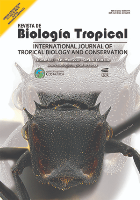
REVISTA DE BIOLOGIA TROPICAL
Scope & Guideline
Advancing knowledge of tropical ecosystems.
Introduction
Aims and Scopes
- Echinoderm Research and Ecology:
The journal prominently features studies on echinoderms, exploring their taxonomy, ecology, and physiological responses to environmental changes. This includes investigations into species distribution, reproductive strategies, and the impact of anthropogenic factors on their populations. - Molecular and Genetic Approaches:
Recent publications emphasize the use of molecular techniques, such as DNA barcoding and genetic analysis, to improve species identification and understand genetic diversity within tropical ecosystems. - Aquaculture and Sustainable Practices:
There is a growing focus on the aquaculture of echinoderms, particularly sea urchins, highlighting sustainable practices and the ecological implications of aquaculture operations. - Conservation Biology:
The journal seeks to address conservation issues through research that informs management strategies, habitat restoration efforts, and the ecological significance of tropical species. - Interdisciplinary Approaches:
The Revista de Biologia Tropical encourages interdisciplinary studies that integrate ecological, genetic, and conservation perspectives, contributing to a holistic understanding of tropical biodiversity.
Trending and Emerging
- Impact of Climate Change:
Recent studies increasingly address the effects of climate change on tropical ecosystems, particularly regarding how species adapt to shifting environmental conditions and the implications for biodiversity. - Marine Conservation and Restoration:
There is a growing emphasis on marine conservation efforts, specifically in coral reef restoration and the management of marine protected areas, reflecting the urgent need to address marine biodiversity loss. - Ecological Interactions and Network Dynamics:
Research exploring ecological interactions among species, including predator-prey dynamics and competition, is gaining traction, as it is essential for understanding ecosystem functioning. - Ethics and Welfare in Research:
The journal is beginning to include more discussions on the ethical considerations surrounding invertebrate research, highlighting the importance of welfare in scientific practices. - Technological Innovations in Ecology:
Emerging themes include the use of technology and innovative methodologies in ecological studies, such as remote sensing and molecular tools, which are enhancing data collection and analysis in tropical research.
Declining or Waning
- Historical and Paleobiological Studies:
Research focused on historical and paleobiological aspects, such as the paleogeography of ancient ecosystems, has decreased, possibly overshadowed by contemporary ecological studies and conservation efforts. - General Biodiversity Surveys:
There has been a notable reduction in general biodiversity surveys that do not focus on specific taxa or ecological interactions, as the journal increasingly prioritizes targeted and applied research. - Non-Echinoderm Invertebrate Studies:
As the journal's emphasis shifts towards echinoderm research, studies on other invertebrate groups appear to be less frequent, suggesting a narrowing of focus within the broader invertebrate research landscape.
Similar Journals

Journal of Insect Biodiversity
Exploring the Intricacies of Insect LifeJournal of Insect Biodiversity, published by MAGNOLIA PRESS in New Zealand, offers a vital platform for researchers and professionals interested in the intricate world of insect science. Established in 2019, this journal covers a wide array of topics within its field, focusing on the ecological, evolutionary, and behavioral aspects of insects, while also engaging with paleontological perspectives. With an impressive Q2 and Q3 categorization in multiple ecological disciplines and a growing influence in the Scopus rankings, it serves as an essential resource for scholars aiming to deepen their understanding of insect diversity and its implications for ecosystems. The journal is committed to open access, promoting the dissemination of knowledge without barriers. Researchers, students, and professionals alike will benefit from the timely contributions this journal offers as it continues to reflect the dynamic and evolving nature of insect research up to the year 2024.
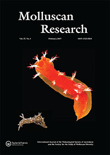
MOLLUSCAN RESEARCH
Connecting Science and Conservation in MollusksMolluscan Research is a distinguished journal dedicated to advancing the field of molluscan science, covering a broad spectrum of topics including taxonomy, ecology, evolutionary biology, and conservation. Published by Taylor & Francis Ltd, this journal has been a crucial resource for researchers from its inception in 1987 up to 2024, significantly contributing to the understanding of molluscan species and their roles in various ecosystems. With an impressive impact factor and recognized within the Q3 quartile rankings in Animal Science and Zoology and Ecology, Evolution, Behavior and Systematics, as well as Q4 in Genetics, Molluscan Research serves as a vital platform for dissemination of high-quality original research and reviews. While it does not currently offer Open Access options, the journal remains accessible through institutional subscriptions, fostering collaboration and knowledge-sharing among researchers, professionals, and students across the globe.
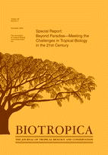
BIOTROPICA
Leading the way in ecological and evolutionary research since 1979.BIOTROPICA is a premier journal published by Wiley, specializing in the fields of Ecology, Evolution, Behavior, and Systematics. With a robust impact factor and positioned in the Q1 category in its field, it stands out as a leading source of research that informs and shapes our understanding of biodiversity and ecosystem management. Since its inception in 1979, BIOTROPICA has been dedicated to publishing high-quality articles that advance scientific knowledge and foster conservation efforts globally. Researchers and professionals alike value the journal for its rigorous peer-review process and its influence in academic discourse, demonstrated by its Scopus ranking placing it in the 70th percentile among its peers. While the journal does not currently offer open access, it continues to be a vital resource for those engaged in the study of biological systems, making significant contributions to the advancement of ecological science. Readers can expect to find a wealth of innovative research and perspectives that are critical to addressing contemporary environmental challenges.

CAHIERS DE BIOLOGIE MARINE
Navigating the Depths of Marine KnowledgeCAHIERS DE BIOLOGIE MARINE, published in France, is a distinguished journal in the field of Aquatic Sciences, known for its interdisciplinary exploration of marine biological research. With ISSN 0007-9723 and E-ISSN 2262-3094, it has served as a vital platform for disseminating scientific knowledge since its inception in 1992. The journal is indexed in Scopus, where it currently holds a position of rank #172 out of 247 in the Aquatic Science category, landing in the 30th percentile, reflecting its commitment to quality research in the domain. Although it operates as a traditional access journal, CAHIERS DE BIOLOGIE MARINE encourages scholarly contribution from both emerging and established researchers, making significant strides in understanding marine ecosystems and biota. As such, it remains an essential resource for professionals and students aiming to contribute to the growing body of knowledge in aquatic sciences.

Journal of Asia-Pacific Biodiversity
Advancing ecological knowledge for a sustainable Asia-Pacific.Journal of Asia-Pacific Biodiversity is an esteemed academic journal dedicated to advancing knowledge in the dynamic fields of biodiversity, ecology, and related biological sciences. Published by the NATL SCIENCE MUSEUM & KOREAN NATL ARBORETUM, this journal serves as a crucial platform for researchers and professionals seeking to explore and disseminate impactful findings pertaining to the Asia-Pacific region's rich biological diversity. With an E-ISSN of 2287-9544, the journal is indexed in leading databases, achieving a Q3 ranking across various categories in 2023, including Animal Science and Zoology, Ecology, Insect Science, and Plant Science. It strives to unite scientific research across disciplines, thus fostering a deeper understanding of ecological dynamics and conservation efforts within this vital region. The journal operates with an open access policy, ensuring that findings are widely available for widespread benefit, making it an essential resource for students, researchers, and environmental practitioners alike. Since its initiation in 2013 and continuing through 2024, the journal remains committed to delivering high-quality, peer-reviewed articles that contribute significantly to the global conversation on biodiversity and ecosystem sustainability.
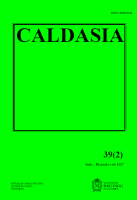
CALDASIA
Bridging Research and Innovation in Biological SciencesCALDASIA is a distinguished open-access journal dedicated to the field of Agricultural and Biological Sciences, published by INST CIENCIAS NATURALES, MUSEO HISTORIA NATURAL since its inception in 1981. Based in Colombia, this journal plays a pivotal role in disseminating scientific knowledge and fostering research collaboration across the globe. With a focus on diverse subjects within the biological sciences, CALDASIA aims to bridge gaps in research and support scholars, professionals, and students in advancing their work. With a 2023 Scopus Ranking of #132 out of 221 in its category, representing a 40th percentile ranking, it holds a solid position in the academic community, particularly recognized for its contributions to miscellaneous areas within agricultural and biological sciences. The journal remains committed to enhancing accessibility, as evidenced by its open-access policy since 2001, thereby ensuring that research findings reach a wider audience without barriers. For those returning to this vibrant field, CALDASIA serves as an essential resource for contemporary findings and discussions that shape environmental and biological scholarship.

Diversity-Basel
Pioneering research that bridges the gap between science and sustainability.Diversity-Basel is a premier open-access journal published by MDPI, specializing in the vital fields of agricultural, biological, and ecological sciences. Launched in 2009, this multidisciplinary journal, operating from Switzerland, aims to disseminate high-quality research that advances the understanding of biodiversity and ecosystem dynamics. With an impressive impact factor and notable rankings in Scopus, including Q1 classification in Agricultural and Biological Sciences and strong positions in Ecology and Ecological Modeling, Diversity-Basel stands as a valuable resource for global researchers, professionals, and students alike. Its commitment to accessibility enables researchers to reach a wider audience, fostering collaboration and innovation in addressing pressing environmental challenges. By providing an inclusive platform for diverse scientific inquiries and innovations, Diversity-Basel plays an essential role in shaping the discourse on biodiversity conservation and management, encouraging the pursuit of sustainable solutions in our rapidly changing world.
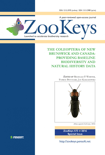
ZooKeys
Unlocking the Secrets of Animal Science and Ecology.ZooKeys, published by Pensoft Publishers, is a premier open access journal dedicated to all aspects of zoology and related biological disciplines. Since its inception in 2008, ZooKeys has emerged as a leading platform in the field, consistently showcasing groundbreaking research that spans diverse areas including animal science, ecology, and paleontology. With an impressive impact factor and categorized in the Q1 quartile for several categories such as Agricultural and Biological Sciences and Insect Science, the journal is recognized for its scholarly contributions, attracting researchers and professionals globally. Located in Sofia, Bulgaria, ZooKeys not only enhances the visibility of its publications through rigorous peer review but also ensures accessibility to vital findings, furthering academic discourse. As the journal continues to converge research efforts through 2024 and beyond, it remains an invaluable resource for students and academics aiming to stay at the forefront of zoological and ecological innovation.
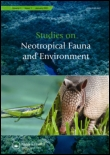
STUDIES ON NEOTROPICAL FAUNA AND ENVIRONMENT
Advancing Knowledge on Fauna and Environmental DynamicsSTUDIES ON NEOTROPICAL FAUNA AND ENVIRONMENT is a distinguished academic journal published by Taylor & Francis Ltd, dedicated to advancing the fields of Animal Science, Zoology, and Ecology. With an ISSN of 0165-0521 and an E-ISSN of 1744-5140, this journal has been a significant outlet for scholarly research since its inception in 1976, continuing to provide critical insights into neotropical biodiversity and the environmental intricacies of this rich ecological region through 2024. Recognized in the Q3 category for both Animal Science and Ecology, the journal ranks at #232/490 in Animal Science and Zoology and #402/721 in Ecology, marking it as a valuable resource for researchers, professionals, and students interested in ecological and zoological studies. By offering a platform for innovative research and comprehensive reviews, the journal aims to bridge the gap between theory and practical application, facilitating a deeper understanding of the unique challenges and conservation strategies relevant to neotropical ecosystems. Although not an open-access journal, it plays a crucial role in fostering academic discourse and knowledge dissemination in its field, ensuring that critical advancements in understanding neotropical fauna and environmental dynamics reach a diverse and engaged audience.
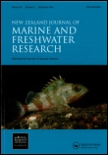
NEW ZEALAND JOURNAL OF MARINE AND FRESHWATER RESEARCH
Championing Ecological Research for Tomorrow's ChallengesNEW ZEALAND JOURNAL OF MARINE AND FRESHWATER RESEARCH, published by Taylor & Francis Ltd, stands as a distinguished platform for the dissemination of innovative research in the realms of aquatic science and ecology. With an ISSN of 0028-8330 and E-ISSN 1175-8805, this journal has been curating significant scientific contributions since its inception in 1967, continuing through to 2024. Recognized in the Q2 category across multiple relevant fields—including Aquatic Science, Ecology, and Water Science—this journal ranks notably in Scopus, with a 74th percentile for Ecology, Evolution, Behavior and Systematics, highlighting its impact and relevance within the scientific community. Though not an open-access publication, its rigorous peer-reviewed articles offer insights that resonate with researchers, professionals, and students who are passionate about advancing our understanding of freshwater and marine ecosystems. By fostering a collaborative space for ecological and environmental inquiries, the NEW ZEALAND JOURNAL OF MARINE AND FRESHWATER RESEARCH is essential for those aiming to contribute to the vital conversations around biodiversity, conservation, and sustainable management of aquatic resources.